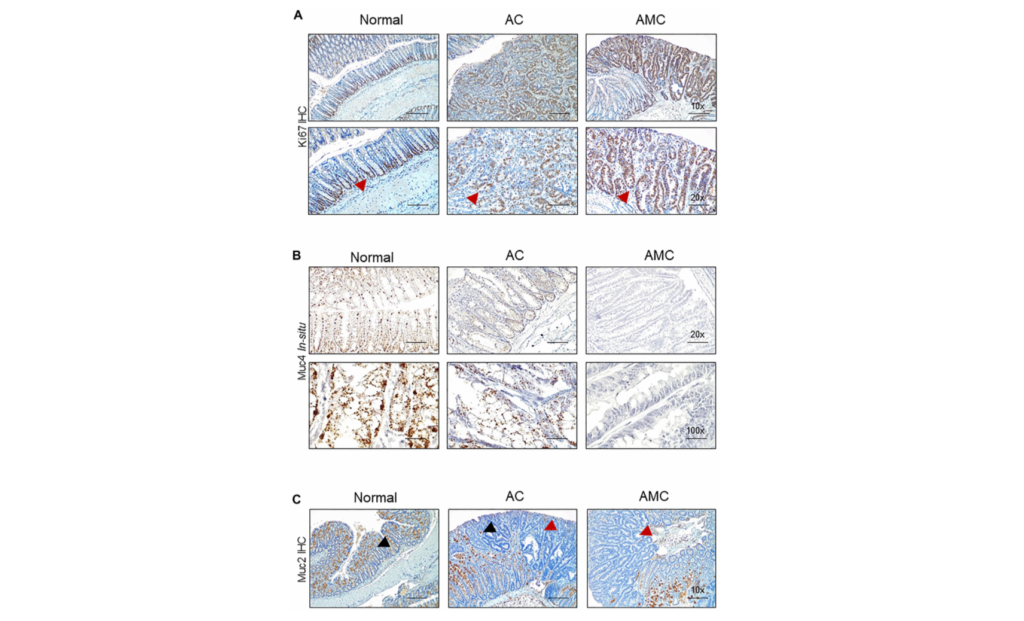The Trending With Impact series highlights Aging (Aging-US) publications that attract higher visibility among readers around the world online, in the news, and on social media—beyond normal readership levels. Look for future science news about the latest trending publications here, and at Aging-US.com.
—
With age, humans undergo bodily changes which include a decline in organ and tissue function. The average age men and women are diagnosed with colorectal cancer (CRC) is 68 and 72 years old, respectively. Healthy intestinal epithelial cells are usually lined with a sufficient layer of mucus; important components in this mucus layer, called mucins, help to maintain physiological homeostasis. While transmembrane mucin 4 (Muc4) has been found to be overexpressed in pancreatic, ovarian and breast cancers, Muc4 expression is decreased in patients with CRC. The functional role and implications of Muc4 in CRC’s intestinal pathology have not yet been adequately investigated.
Researchers—from the University of Nebraska Medical Center, Baylor College of Medicine, University of California San Diego, and VA San Diego Healthcare System—sought to better understand the role of Muc4 in CRC by developing genetically engineered mouse (GEM) models. Their priority research paper was published as the cover of Aging-US Volume 14, Issue 5, and entitled, “Depletion of transmembrane mucin 4 (Muc4) alters intestinal homeostasis in a genetically engineered mouse model of colorectal cancer.“
“Therefore, to understand the functional significance of MUC4 in intestinal homeostasis and CRC progression, we developed a GEM model by crossing mice carrying a conditional mutation of Apc [adenomatous polyposis coli] gene with colon-specific caudal type homeobox transcription factor 2 (Cdx2)-Cre fused with estrogen receptor.”
The Study
The researchers first conducted an analysis of CRC patients using The Cancer Genome Atlas. They found that CRC patients had decreased Muc4 levels compared to normal patients and that lower Muc4 expression is associated with a worse prognosis in CRC patients. In CRC, the most frequent mutations were found to occur in the Apc gene. Therefore, the researchers tested control mice and two mouse models in this study. The AMC GEM model had an Apc mutation, and Muc4 was knocked out. The AC GEM model was AMC’s contemporary littermate control and had only the Apc mutation—Muc4 was not knocked out. Tamoxifen was then intraperitoneally administered to exert conditional control of gene expression in the mice.
Next, the team conducted mucin staining to characterize goblet cell function. Goblet cells protect the intestine by secreting mucins. In addition to Apc mutations, many CRC patients have Kras gene mutations. Therefore, the researchers also crossed the AMC mouse model with a mutated Kras mouse model. Finally, the researchers examined two human CRC cell lines in vitro. They performed a knockdown of Muc4 and conducted a cellular fractionation study of the cell lines.
“Knockdown (KD) of MUC4 increased the expression of β-catenin, cyclin-D1, and CD44 at the transcript level in LS-180 and HCT-8 cells (Supplementary Figure 3C).”
The Results
The researchers found that Muc4 deletion in the AMC mice resulted in more colorectal tumors with high-grade dysplasia compared to AC and normal mice. Immunohistochemistry staining revealed that AMC and AC mice did not produce any visible goblet cells.
“We observed that in both AMC and AC mice, there was a complete absence or loss of staining in the goblet cells of colon adenoma (Figure 2E), suggesting that disruption of goblet cell function alters the mucin production.”

Muc4 knock-out in AMC mice was associated with an upregulation of Muc13 and a significant loss of Muc2 and Fam3D in CRC tissues. The researchers observed that Muc4 deletion resulted in defective mucus barrier function, reduced intestinal homeostasis and up-regulated β-catenin signaling. In the Kras/AMC mice, they found that the addition of the Kras mutation further aggravated tumors and reduced survival.
Conclusion
The research team found that, in the AMC GEM model (lacking mucin expression), there was an increase in inflammation, DNA damage, tumor burden, and CRC cell proliferation. The study’s findings provide evidence that Muc4 expression is essential for the proper maintenance of the mucus layer and intestinal homeostasis. Furthermore, this research suggests that reduced expression of Muc4 may be associated with aging and a predisposition to colorectal cancer.
“In conclusion, our study suggests that Muc4 has a protective role in CRC progression in an Apc mutant GEM mice model. Muc4 maintains the intestinal homeostasis by upregulation of Muc2 and Fam3D (guardians of the gut) and downregulation of cancer-promoting mucin (Muc13). Additionally, presence of Muc4 prevents the invasion of microbiota and reduction of proinflammatory cytokines and decrease in epithelial cell proliferation by inhibiting β-catenin, c-Myc and CD44 expression. Additional studies are needed to understand the role of Muc4 in conditional KO mouse models and various sub-types of CRC.”
Click here to read the full priority research paper published by Aging (Aging-US).
AGING (AGING-US) VIDEOS: YouTube | LabTube | Aging-US.com
—
Aging (Aging-US) is an open-access journal that publishes research papers bi-monthly in all fields of aging research. These papers are available to read at no cost to readers on Aging-us.com. Open-access journals offer information that has the potential to benefit our societies from the inside out and may be shared with friends, neighbors, colleagues, and other researchers, far and wide.
For media inquiries, please contact [email protected].
